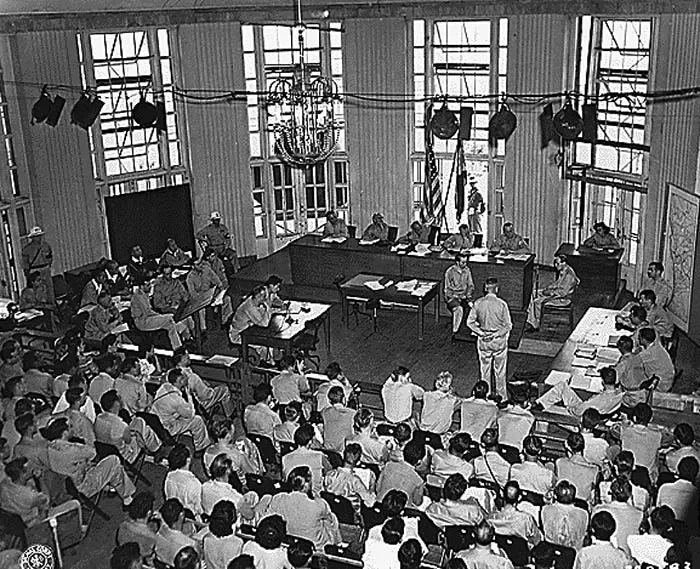Testimony of Timoteo Magsombol on Japanese Atrocities Committed in Cuenca, Batangas in 1945
[TRANSCRIPTION]
This page contains the testimony of Timoteo Magsombol on Japanese atrocities committed in the town of Cuenca, Batangas in 1945. The pages contained herein are now declassified and were part of compiled documentation1 of war crimes trials conducted by the United States Military Commission after the conclusion of World War II. This transcription has been corrected for grammar where necessary by Batangas History, Culture and Folklore. The pagination is as it was contained in the original document for citation purposes.
 |
| Photo taken during the war crimes trials in Manila. Image credit: U.S. National Archives. |
[p. 1746]
TIMOTEO MAGSOMBOL
DIRECT EXAMINATION
A Timoteo Magsombol.
Q Where do you live?
A Sablay sitio, City [should be municipality] of Cuenca.
Q Is that near Cuenca?
A More or less two kilometers.
Q Were you living there on the 11th day of March, 1945?
A Yes, sir.
Q What happened on that day?
A About 9:00 P.M., three Japanese came and took me.
Q Where did they take you?
A They brought me into their tunnel, City [municipality] of Cuenca, Batangas.
Q How many other men did they take there?
A 40 persons.
Q How many people did the Japanese take to the tunnel which you have spoken of?
A They brought there 40 persons in all.
Q And what did you do after you got to the tunnel?
A We were told to work day and night and we were not permitted to go out.
Q What kind of tunnel was it?
A At the side of the tunnel, water passed, and the tunnel
[p. 1747]
Q How long did you work on this tunnel for the Japanese?
A It lasted eight days.
Q What were you fed during these eight days while you were working on this tunnel for the Japanese?
A A bowl of rice sometimes; that’s all.
Q What happened on the 19th day of March, 1945?
INTERPRETER GOJUNCO: I beg your pardon, please?
CAPTAIN PACE: “What happened on the 19th day of March, 1945?”
Q (By Captain Pace) What happened, then?
A 15 meters.
Q What happened, then?
A I was told to lie flat on my stomach and I was bayoneted.
Q How many times?
A When I regained consciousness the next morning, I found out that I had eight wounds.
Q Will you look at Exhibit 276 for identification and state what it is?
A I see one wound on my right breast originating from the back and another wound on the left part of my breast originating also from the back.
Q Do you mean that the mark on your right breast and the mark on your left breast came as a result of bayonet thrusts that began on your back? Is that right?
[p. 1748]
Q Will you point at the four wounds on your breast?
A (Indicating wounds on breast on Exhibit 276 for identification.)
CAPTAIN PACE: The witness has indicated three dark spots on the right side of his chest just inside of his shoulder and one spot just inside of his left shoulder.
I offer this exhibit in evidence.
GENERAL REYNOLDS: The picture is so unclear, the Commission would ask the witness to raise his shirt and show us the wounds.
A (Displaying wounds on chest and left shoulder.)
A (Indicating wounds on back.)
CAPTAIN PACE: Three wounds on his back about the center of the right side and one on the left side at about the center.
GENERAL REYNOLDS: Very well. The document is accepted in evidence.
for identification was re-
ceived in evidence.)
[p. 1749]
for identification was re-
ceived in evidence.)
A Yes, sir.
Q When did you regain consciousness?
A The next morning.
Q What did you see when you woke up?
A I found out that I had the wounds.
Q Did you see anybody else around there?
A I saw ten dead bodies, my friends.
Q What happened to them?
A I saw them lying flat on their stomachs, some with bayonet wounds and others were fired upon.
Q Were they all dead?
A They were all dead.
CROSS EXAMINATION
A I don’t know.
Q Well, was it — Go ahead.
A When I was bayoneted, I was unconscious.
Q Before you were bayoneted, how long did you lay down on the ground?
A Less than five minutes. Then, I was bayoneted.
Q Were you lying face down?
[p. 1750]
CAPTAIN REEL: That’s all.
CAPTAIN PACE: Thank you very much.
